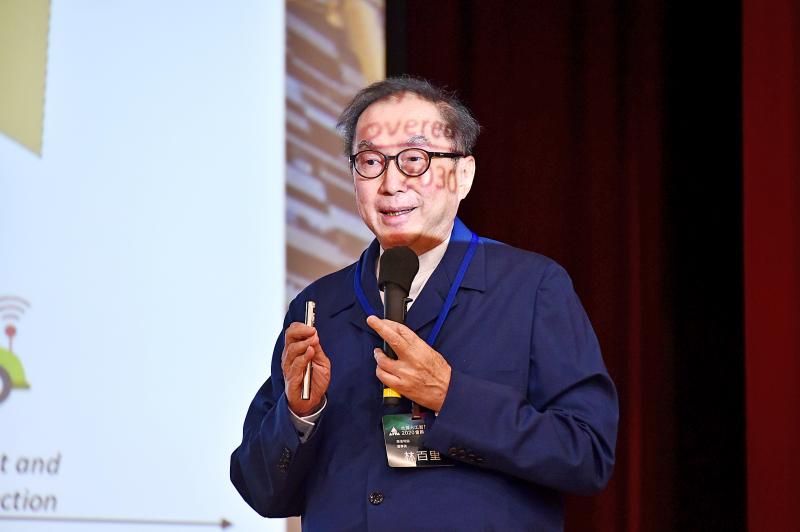Quanta Computer Inc (廣達電腦) is to invest NT$910 million (US$32.15 million) to expand capacity in Thailand through its subsidiary QMB Co, the company said in a regulatory filing yesterday.
The investment is part of Quanta’s NT$2 billion Thai expansion plans, which it announced in a regulatory filing in November last year.
QMB was established in 2019 as a part of Quanta’s efforts to exit China amid a US-China trade dispute.

Photo: Tu Chien-jung, Taipei Times
In an investors’ conference call, Quanta chairman Barry Lam (林百里) described the move to Thailand as a “must.”
According to the Taiwan Stock Exchange filing, Quanta entered into a contract with Cheer You Construction Thailand (啟宇營造).
The money would be used for materials and construction of factory facilities for “expanding production capacity, it said.
Quanta’s board approved the plan the same day, it said.
Quanta is the world’s biggest contract notebook computer maker, although Lam told an investors’ conference in November last year that the company is expanding its business into new technologies, such as robotic arms, artificial intelligence testing equipment and driverless vehicles.
In addition to investing in Thailand, Quanta has continued to expand its Taiwanese production capacity.
Chinese-language online news outlet cnYES.com reported that Quanta has completed a third production building across the road from its headquarters in New Taipei City’s Linkou District (林口) to produce servers and other high value-added products starting from the second quarter of this year.

SETBACK: Apple’s India iPhone push has been disrupted after Foxconn recalled hundreds of Chinese engineers, amid Beijing’s attempts to curb tech transfers Apple Inc assembly partner Hon Hai Precision Industry Co (鴻海精密), also known internationally as Foxconn Technology Group (富士康科技集團), has recalled about 300 Chinese engineers from a factory in India, the latest setback for the iPhone maker’s push to rapidly expand in the country. The extraction of Chinese workers from the factory of Yuzhan Technology (India) Private Ltd, a Hon Hai component unit, in southern Tamil Nadu state, is the second such move in a few months. The company has started flying in Taiwanese engineers to replace staff leaving, people familiar with the matter said, asking not to be named, as the

The prices of gasoline and diesel at domestic fuel stations are to rise NT$0.1 and NT$0.4 per liter this week respectively, after international crude oil prices rose last week, CPC Corp, Taiwan (台灣中油) and Formosa Petrochemical Corp (台塑石化) announced yesterday. Effective today, gasoline prices at CPC and Formosa stations are to rise to NT$27.3, NT$28.8 and NT$30.8 per liter for 92, 95 and 98-octane unleaded gasoline respectively, the companies said in separate statements. The price of premium diesel is to rise to NT$26.2 per liter at CPC stations and NT$26 at Formosa pumps, they said. The announcements came after international crude oil prices

A German company is putting used electric vehicle batteries to new use by stacking them into fridge-size units that homes and businesses can use to store their excess solar and wind energy. This week, the company Voltfang — which means “catching volts” — opened its first industrial site in Aachen, Germany, near the Belgian and Dutch borders. With about 100 staff, Voltfang says it is the biggest facility of its kind in Europe in the budding sector of refurbishing lithium-ion batteries. Its CEO David Oudsandji hopes it would help Europe’s biggest economy ween itself off fossil fuels and increasingly rely on climate-friendly renewables. While

SinoPac Financial Holdings Co (永豐金控) is weighing whether to add a life insurance business to its portfolio, but would tread cautiously after completing three acquisitions in quick succession, president Stanley Chu (朱士廷) said yesterday. “We are carefully considering whether life insurance should play a role in SinoPac’s business map,” Chu told reporters ahead of an earnings conference. “Our priority is to ensure the success of the deals we have already made, even though we are tracking some possible targets.” Local media have reported that Mercuries Life Insurance Co (三商美邦人壽), which is seeking buyers amid financial strains, has invited three financial